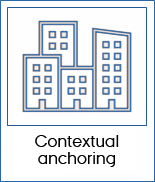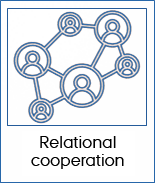Peer mentoring is a professional, cooperative, and reflective conversation between two or more colleagues. A structured framework for peer mentoring makes it an effective and flexible method for reflexive reflexive teaching and supervision practice and for pedagogical competence development among university lecturers.
Peer mentoring is a professional, cooperative, and reflective conversation between two or more colleagues aiming for educational development and learning.
The characteristics of peer mentoring as a professional learning community are that it works towards a de-privatisation of practice and that the professionals learn from and with each other (Albrechtsen, 2013).
There are many ways to work with peer mentoring. Regardless of which method you choose, it gives status and importance to peer mentoring if it is set in a structured framework with significant management support. Peer mentoring works best when it is framed and marked in the calendar. This can create a culture where peer mentoring is an essential everyday tool. The professional framing of peer mentoring in everyday life makes it an effective and flexible method for reflective teaching and supervision practice and for pedagogical competence development among university teachers.
The formats for peer mentoring described in this guide can easily be used as a tool in already existing collaborations, collegial communities, and more formal meeting forums. The point is that peer mentoring can be implemented merely by slightly adjusting the conversation structure in existing forms of collegial collaboration without adding a large number of meetings to an already busy schedule. See, for example, how debriefing can be used to share knowledge in a teaching team and how the reflective investigation can be used to strengthen the pedagogical choices of a teaching team that already meets to discuss, plan, and evaluate teaching.
The figure above shows a “landscape” with different methods for peer mentoring. Some methods are in pairs while others involve three or more colleagues. Some methods can be used if you have a short time available and want to start small, e.g., 1-1 peer mentoring (Schein & Schein, 2021), while others require more time and a greater effort. These more time consuming methods are extremely suitable and well-documented as quality-assuring, change-creating, and competence-developing efforts, e.g., Debriefing in teacher team (Coggins et al., 2021; Harris et al., 2014; Ross, 2021) og Observation-based peer group mentoring (de Lange & Wittek, 2022; de Lange & Wittek, 2018, 2023).
Reflective practice is a cornerstone of pedagogical competence development and therefore a crucial practice to be able to engage in if you want to develop your teaching and your role as a teacher. Being a reflective practitioner (Dewey, 2012; Greenberger, 2020; Schön, 1987) involves a systematic and critical examination of factual dimensions of your teaching practice and a subjective understanding of your teaching practice with the aim of improving the quality of your teaching and the students' learning (Christensen & Kjær, 2023; Kelchtermans, 2009).
One can distinguish between two meanings of the word reflection. On one hand, reflection can mean thought (or second thought), where you think more deeply about something by taking a conscious step back from the practice and holding it at arm's length, so to speak, and taking a closer look at it by talking about it or writing about it. On the other hand, reflection can mean mirroring, where you see something through the eyes of others, and others can mirror a person by giving feedback. Both thought and mirroring are at stake in peer mentoring.
In peer mentoring, reflective practice is when participants:
In that way, peer mentoring and reflective practice are means to achieve a robust and developing teaching culture, which is motivating and inspiring for teachers to be a part of.
This is a short review of international research on the important factors for implementing peer mentoring in higher education. Overall, research shows that peer mentoring is a helpful practice that encourages collaboration among teachers in higher education. It enables teachers to reflect on their teaching methods and identify areas for improvement. However, the institution (e.g. the department, school, or faculty management team) is responsible for creating a work environment that allows teachers to prioritize peer mentoring alongside their other teaching responsibilities.
The review below highlights three important arguments.

It is the responsibility of the educational institution to ensure that contextual conditions encourage peer mentoring to be integrated into a teacher’s existing tasks (de Lange & Wittek, 2023; Veles et al., 2023). This will prevent teachers from perceiving it as an additional workload. Hence, peer mentoring should be regarded as an integral component of the teacher’s role and be given equal importance compared to other teaching-related tasks. Furthermore, there must be a clear distinction between peer mentoring and summative processes. For example, studies have shown that pay has a limited effect on teachers’ motivation to engage in peer mentoring (Esterhazy, 2021). On the contrary, peer mentoring should be flexible, and institutions should refrain from imposing a uniform and predetermined structure on the process. A flexible approach that builds on what the teacher prefers to discuss fosters the values of peer mentoring. Peer mentoring further appears to work better in the long term when the initiative is both top-down and bottom-up when compared with when it is initiated and conducted solely based on grassroots initiatives.

Teachers can feel vulnerable when being observed during a class, and giving feedback to a colleague can be challenging. However, the collaborative and relational aspects of peer mentoring prevent these situations by promoting a cooperative culture within the practice community (Mårtensson et al., 2014; Roxa & Martensson, 2009). Research has shown that trust can be enhanced when teachers are given the autonomy to select their peers for mentoring and are transparent about the difficulties they might encounter while teaching (de Lange & Wittek, 2022). Particularly, the supervision process must unfold as a dialogue between colleagues rather than commanding written reports of what has been discussed.

The individual experience of teachers varies when it comes to peer mentoring (Esterhazy et al., 2023). Some possess extensive teaching experience while others are relatively new to the teacher role. The research shows that some teachers – new as well as experienced – experience a feeling of not having the skills to give feedback on the teaching of other colleagues. One solution could be to involve professional educational developers within higher education to train the teachers in feedback and to create a more equal dynamic between the participants, and thus address unequal power relations between colleagues (Steinert et al., 2019; van Lankveld et al., 2017). Hence, research recommends teacher training in methods to facilitate the peer mentoring process (de Lange & Wittek, 2023). The purpose of these methods is to encourage teachers to gain a deeper comprehension of their teaching practices, including their beliefs about teaching and how they practice it. With this knowledge, teachers gain a better understanding of feedback received from colleagues, and they can provide more nuanced and deliberate feedback in return.
This guide takes its point of departure from the Danish framework for advancing university pedagogy, which includes two dimensions of competence: the operative space and the collegial community. The guide particularly relates to university teachers’ collegial scope for action, where teaching and educational development are seen as a community of practice.
The guide is an inspiration for teachers and educational leaders who wish to work reflectively on their professional development in teaching, educational leadership, and supervision.
Texts and figures in the guide have been prepared based on recommendations from research literature, specialist books on peer mentoring, and excellent experiences from practice at the Centre for Educational Development, AU.